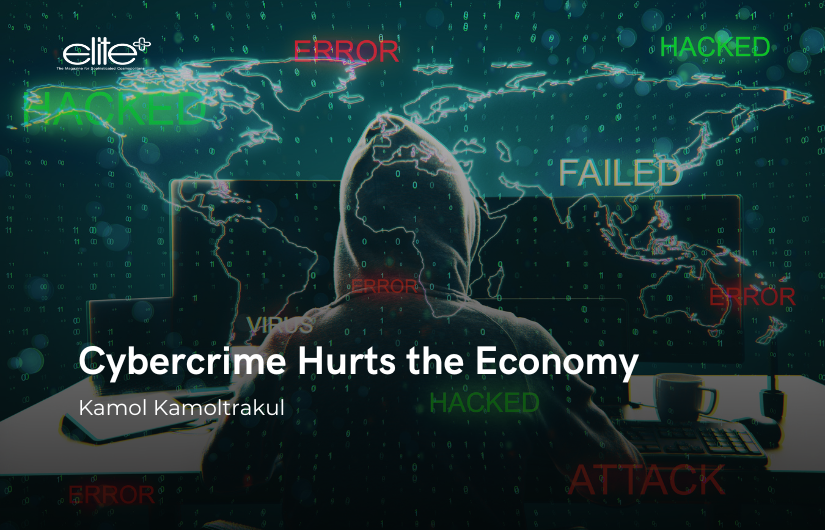Cybercrime, or online scams, has been spreading like wild fire in recent years and has emerged as a major cause of capital flight, damaging the economy.
The financial impact of cybercrime on the economy and society is expected to surge further to as much as USD 10.5 trillion by 2025, up from USD 3 trillion in 2015, according to the Central Investigation Bureau (CIB). In Thailand, common cybercrimes include online transaction scams, phishing, romance scams and crypto investment scams. According to the legal services ILCT Intellectual Property Practice Group, between March 2022 and July 2024, total damages amounted to THB 69.1 billion, or approximately THB 78 million per day.
As the crime trend for 2025 focuses heavily on cybercrime and call centre scams, the Central Investigation Bureau (CIB) is prioritising the study of online scammers' tricks and behaviours to prepare for the constantly evolving tricks. CIB Commissioner Pol Lt Gen Jirabhop Bhuridej recently spoke with the Bangkok Post, revealing the state of cybercrime over the past year.
Accordingly, the CIB also found that the majority of victims were working-age individuals (25–45 years old) due to their higher purchasing power, followed by elderly people (55 years and older) due to their limited digital knowledge. Pol Lt Gen Jirabhop said cybercrimes will remain the primary criminal trend this year. He explained that 279,861 petitions regarding cybercrimes were filed with the Thai Police Online (TPO) platform between 1 Jan and 30 Sept last year, resulting in damages of at least THB 28.01 billion. Most of the petitions -- 123,865 in total -- concerned service scams while investment scams caused the highest financial losses of THB 10.229 billion.
The High-Tech Crime Division at the Thai Cyber Crime Investigation Bureau reported there were around 700 scam and fraud cases occurring daily, with e-commerce scams being particularly prevalent, accounting for around 40% of Thai cybercrime. These online frauds resulted in substantial financial losses of approximately THB 45 billion over 2023 and the first half of 2024.
According to the FBI, there are 5 types of common Cyber crime. The first, criminal hacking is the act of gaining unauthorized access to data in a computer or network. Next, malware, or malicious software, refers to any code designed to interfere with a computer's normal functioning to commit a cybercrime. Third is identity theft, which occurs when someone “unlawfully obtains another individual's personal information and uses it to commit theft or fraud”. According to the FBI, a common method for perpetrating identity theft is phishing, which refers to a method used by cyber criminals to obtain confidential information using emails or texts. Scammers pose as a trusted source, often a bank or well-known company, and trick recipients into providing personal information such as account passwords and social security numbers. Phishing messages often use a story, for example, a claim that the sender has noticed suspicious activity with an account, to entice recipients to click a link or open an attachment.
The fourth, social engineering, is the psychological manipulation of people into performing actions or divulging confidential information. Cyber criminals use social engineering to commit fraud online. Platforms such as online dating sites provide opportunities to initiate conversations with potential victims. Once the criminal establishes a relationship with the target and gains their trust, the criminal asks for money or information. Social engineering techniques are often combined with technology elements. For example, phishing attempts often make use of deceptive and manipulative messaging in addition to malware and fake websites.
The fifth type of crime is software piracy, the unauthorized reproduction, distribution and use of software. Pirated software takes the form of counterfeit commercial products, illegal downloads and reproductions, as well as violations of licensing agreements that limit the number of users who can access a program. As much as 37% of software installed on personal computers globally is unlicensed, according to The Software Alliance BSA. In addition to being illegal, pirated software contributes to the spread of malware, which can be inserted by cyber criminals into unauthorised software copies.
Moreover, "generative profiling" attacks, or those utilising AI audio spoofing techniques such as the use of a deep fake voice of a familiar person to target a victim, would be an early part of an AI attack chain in 2024.
However, the global cybersecurity firm, Fortinet, located in Sunnyvale, Calif, reported that Thailand spends only 0.2 % of corporate revenue on security systems. Hence, Krungthai Compass, the research arm of Krungthai Bank, projects Thailand's cybersecurity investment should reach THB 18 billion baht this year.
Furthermore, as the public becomes more aware of how to avoid certain scams, fraudsters are shifting their focus from call centre scams to those causing even more widespread damage — investment scams. Scammers use psychological tactics to deceive victims into unwittingly participating in their schemes. The CIB's research reveals that their primary strategies include promising exceptionally high profits and creating a reliable image.
CIB Commissioner Pol Lt Gen Jirabhop explained that building a trustworthy image can be achieved in many ways, for example, flaunting luxury lifestyles online, hosting seminars or displaying awards. It may also involve celebrity endorsements and fabricated reputations. "CIB studies show that scam gangs promise unrealistic profits while presenting substantial credentials to enhance their reliability," he said.
The CIB commissioner noted that digital literacy and victims' emotional states — particularly greed and fear — play significant roles in scams. Scammers exploit these factors through psychological tricks, imposing time constraints to pressure victims into quick decisions. "These elements are deeply concerning as they contribute to future trends in cybercrime,"
Pol Lt Gen Jirabhop said that despite the police's best efforts, the public is still encouraged to avoid falling for scams. The public should not trust any offers that are “too good to be true,” he said, adding that they should double-check for further information if any investment has unrealistic profits and offers. They should avoid transferring money to strangers and clicking on unfamiliar URLs from mobile messages at all costs. Police also suggested alternating passwords across platforms and opting for two-factor authentication for more online safety. If you suspect fraudulent activity, contact the police and your bank immediately to suspend the affected accounts. As scammers rely on psychological tactics to provoke immediate responses, we urge people to remain cautious and seek expert advice when in doubt."
Moreover, Rattipong Putthacharoen, systems engineering senior manager at Fortinet Thailand, said, according to a Fortinet-IDC survey, the top five common cyberthreats in Thailand are phishing, identity theft, ransomware, patching vulnerabilities and Internet of Things (IoT) attacks. "We found 72% of surveyed organisations in the Thailand reported breaches had doubled in 2023," he said.
The top five most targeted sectors have been technology, healthcare, telecom, government and manufacturing. Mr Rattipong said in terms of loss in value among businesses, ransomware was quite impactful, with 56% of organisations reporting an increase of more than double in losses. He said hackers attacked operating technology mainly in energy, automation and transport worldwide.
Hence, the government is aware of the seriousness of the online scams which hurt the economy, according to a report of Lexology, Thailand Prepares to Enhance Legal Measures against Cybercrime. The Thai cabinet has thus approved a draft amendment of the Emergency Decree on Measures for the Prevention and Suppression of Technological Crimes as proposed by the Ministry of Digital Economy and Society to strengthen measures against technological crimes, particularly targeting call centre scams and cyber fraud. Following the Council of State’s review, the emergency decree will be tentatively enacted this month, becoming effective immediately upon publication in the Government Gazette.
While the draft amendment is not yet publicly available, the government recently indicated that the emergency decree aims to empower authorities with decisive measures to combat cybercrime effectively. It underscores the shared responsibility among various sectors, including banking, telecommunications, and online platforms, in safeguarding against technological crimes.
Key provisions of the draft amendment of the emergency decree include:
- Telecommunications provider obligations: Telecommunications service providers must suspend SIM cards associated with criminal activities. The National Broadcasting and Telecommunications Commission and mobile service providers themselves are authorized to temporarily suspend mobile phone numbers if there is reasonable suspicion of involvement in criminal activities.
-
Banking responsibilities: Financial institutions are required to promptly report mule accounts to the Anti-Money Laundering Office to facilitate quick restitution to victims. The Anti-Money Laundering Transaction Committee is empowered to order the return of funds to victims without requiring a final court ruling.
-
Penalties for noncompliance: The amended emergency decree introduces penalties for noncompliance by regulated entities that fail to prevent criminal activities for offenses related to technology crimes in the following cases:
-
Digital asset services: Those engaged in the buying, selling, or exchanging of digital assets, such as cryptocurrencies and digital tokens, as well as digital asset businesses that launder money obtained from online crimes by converting it into digital currency, will be subject to imprisonment for up to one year, a fine of up to THB 100,000, or both.
-
Online gambling offenses: Those involved in illegal online gambling activities will be subject to imprisonment for up to five years, a fine of up to THB 100,000, or both.
-
Unauthorized sale of personal data: Those engaged in the trading of personal data will be subject to imprisonment for up to five years, a fine of up to THB 5 million, or both.
-
Shared liability: Financial institutions, telecommunications services operators, and social media platforms may be held accountable for damages resulting from their negligence in preventing cybercrimes if they fail to exercise the necessary professional due diligence.
-
Hopefully, the emergency decree would prevent the surge of the cybercrime if it would fully enforced. Anyway, the most important measurement is to shut down the internet services and electrical supply to those cybercrime centers in the Special Economic Zones(SEZs) along the Golden Triangle countries.




















































































































































































































































































































































































































































































































































































































































































































































































































